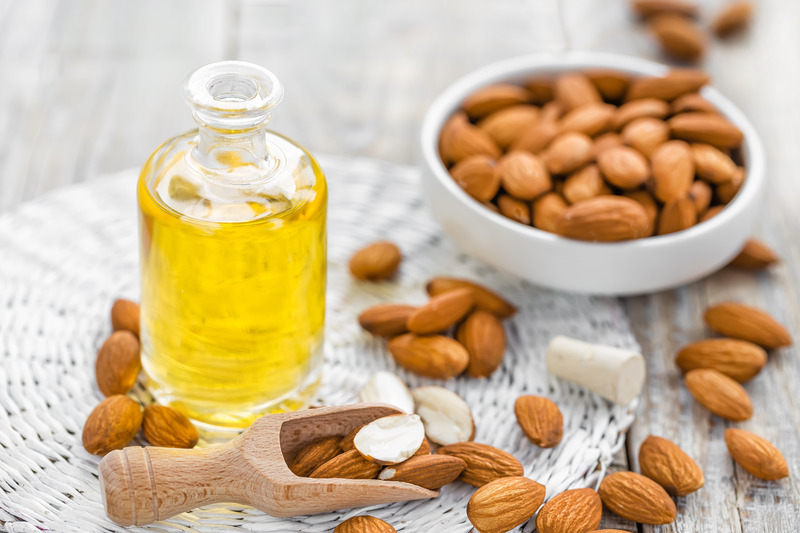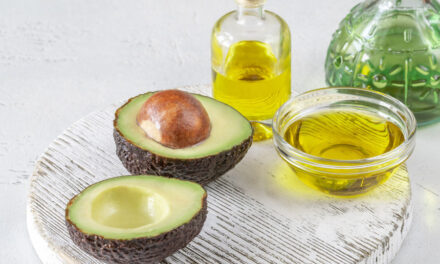
Almond oil has been a secret beauty ingredient for thousands of years, touted for its myriad benefits for skin, hair, and overall well-being. But in today’s modern beauty landscape, how does this ancient elixir stand up, especially when it comes to hair care? Read on to find out.
What Is Almond Oil?
Almond oil is derived from the seeds of the almond tree, scientifically known as Prunus dulcis. Just like olive oil, almond oil is made by pressing the seeds of the almond tree.
Those seeds are what we know colloquially as almonds. Almonds are a popular source of protein when consumed for food.
Almond milk and almond yogurt are popular milk substitutes for those with dairy sensitivities. Typically, there are two types of almond oils—sweet almond oil and bitter almond oil.
For hair care, sweet almond oil is generally preferred due to its rich nutrient profile, including Vitamin E, omega-3 fatty acids, and magnesium.
How Is Almond Oil Extracted?
The oil is extracted by either pressing the nuts, which yield unrefined almond oil or coaxing it out with heat and chemicals, which creates refined almond oil. The extraction process usually involves cold-pressing the almond seeds.
This method retains the maximum amount of nutrients in the oil, making it more effective for hair and skin care.
Benefits of Almond Oil for Hair

Almond oil offers a host of benefits that can transform your hair from dull and lifeless to shiny and luscious. Here are some key benefits:
Deep Conditioning
One of the most celebrated benefits of almond oil is its role as a deep conditioner. The omega fatty acids in the oil penetrate into the hair shaft, effectively hydrating your locks from within.
For those struggling with dry, frizzy hair, incorporating almond oil can offer transformative results.
Moisturizes Hair
One of the most renowned benefits of almond oil is its ability to lock in moisture. Almond oil acts as an emollient, meaning it fills in gaps in your hair at a cellular level, giving it a smoother and softer texture.
Detangling Hair
The smooth texture of almond oil can make it easier to comb through your hair, reducing breakage and hair fall as a result. The slip provided by almond oil minimizes friction, helping you detangle your hair with ease.
This is especially beneficial for curly and wavy hair types that tend to tangle easily.
Promote Hair Growth
Almond oil can be beneficial for promoting hair growth when massaged onto the scalp. Massaging almond oil onto your scalp enhances blood circulation, ensuring that your hair follicles get enough nutrients for healthy growth.
Reducing Split Ends
Split ends often occur due to a lack of nourishment and moisture in the hair strands. The high content of Vitamin E and other essential nutrients in almond oil helps to repair and seal the split ends, making your hair appear healthier and more luscious.
Enhances Blood Circulation in Scalp
Massaging your scalp with almond oil can stimulate blood circulation. Increased blood flow to the scalp can accelerate hair growth by nourishing the follicles.
This can be an effective way to combat thinning hair and promote denser hair growth.
Protects Against Heat Damage
Heat styling tools can take a toll on your hair’s health, leading to dryness and breakage. Almond oil can form a protective layer on your hair, shielding it from heat damage.
Applying a small amount before blow-drying or straightening can make a noticeable difference in the texture and appearance of your hair.
Reduces Frizz
If you are troubled by frizzy hair, almond oil can be your savior. Its emollient properties can smooth out the hair cuticles, reducing frizz, dry hair and giving your hair a sleeker appearance.
Sun Protection
Almond oil contains natural SPF properties that can protect your hair from the damaging effects of the sun. While it should not replace your regular sunblock, using almond oil can provide an added layer of protection against UV radiation.
Adds Luster and Shine
The oil naturally reflects light, adding a luminous shine to your locks. When applied in moderation, almond oil can make your hair look vibrant without making it greasy or weighed down.
Enhances Hair Color and Highlights
If you have color-treated hair, almond oil can enhance and preserve the color. Its hydrating properties help lock in the color, ensuring that it stays vibrant for a longer period of time.
Reduces Scalp Inflammation
The anti-inflammatory qualities of almond oil can help in treating scalp conditions like dermatitis and psoriasis. The soothing effect of the oil can alleviate itchiness and discomfort, leading to a healthier scalp and strengthens hair.
Antioxidant Benefits
Almond oil is rich in antioxidants which can protect your hair and scalp from oxidative stress and environmental pollution. This can be particularly beneficial for people living in urban settings, where exposure to pollutants is often higher.
Hair Types Consideration
Before using almond oil, it’s important to consider your hair type. Here’s a quick guide:
Curly and Coarse Hair
Curly and coarse hair types tend to battle dryness and frizz due to limited natural oils reaching the hair shaft. Almond oil, with its high fatty acid and vitamin content, provides deep moisturization and effectively controls frizz.
Try almond oil as a pre-wash treatment or mix it with your conditioner for nourishing results.
Fine Hair
People with fine hair often avoid oils because they worry it will make their hair look limp or greasy. But, almond oil can still benefit fine hair in moderation.
Apply a small amount to the tips, avoiding the roots. You can also mix a few drops of almond oil with your regular shampoo to nourish without weighing down your hair.
Oily Hair
Contrary to expectations, almond oil can benefit oily hair when used properly. Excessive sebum production may be caused by a dry scalp, prompting sebaceous glands to produce more oil.
Almond oil can help balance this by moisturizing the scalp. A pre-shampoo scalp massage provides the needed hydration without greasiness.
Straight Hair
Straight hair types may have oily roots but dry ends. Applying almond oil to the tips can help balance moisture.
Almond oil can also be used as a deep conditioning treatment for healthy strands.
Wavy Hair
Wavy hair is in between straight and curly types. Almond oil hydrates without weighing down waves.
Use it as a leave-in treatment post-shower for defined waves and a natural shine.
Thinning Hair
Almond oil may help with thinning hair by promoting blood circulation and nourishing hair follicles. Massage it into your scalp a few times a week to potentially promotes hair growth.
Sensitive Scalp
Almond oil can provide relief for a sensitive scalp prone to itchiness and inflammation. A gentle massage with almond oil soothes scalp irritation. First, perform a patch test to check for any allergic reactions to the oil.
How to Use Almond Oil for Hair

Using almond oil for your hair is straightforward. Here are some popular methods to incorporate almond oil into your hair care routine:
Pre-Shampoo Treatment
A popular method of using almond oil is to apply it before shampooing your hair. This is known as a pre-shampoo or pre-poo treatment.
How to Do It
-
Pour a quarter-sized amount of almond oil into your palms.
-
Apply the oil to your hair, focusing on the tips and mid-lengths, then work your way to the scalp.
-
Leave it in for at least 30 minutes or overnight for deep conditioning.
Why This Method Works
This method helps protect your hair from the drying effects of shampoo, especially if you use a formula that contains harsh detergents like sulfates.
Mixed with Conditioner or Hair Mask
You can enrich your regular conditioner or hair mask with a few drops of almond oil.
How to Do It
-
Add 2-3 drops of almond oil to a dollop of your regular conditioner or hair mask.
-
Mix well and apply the mixture after shampooing.
-
Leave it in for 3-5 minutes before rinsing.
Why This Method Works
Adding almond oil enhances the moisturizing effects of your conditioner, making it a dual-action treatment for dry or damaged hair.
Use it as a hair oil
How to Do It
-
Almond oil can add luster and manageability to hair in mere seconds.
-
Place a couple of drops of almond oil into your palms, rub them together to distribute the oil evenly.
-
Then run them down the length of your damp hair to promote shine and smooth flyaways.
Hot Oil Treatment
Hot oil treatments are known for their deep conditioning benefits. Almond oil is an excellent choice for this method due to its high nutrient content.
How to Do It
-
Warm the almond oil slightly—make sure it’s not too hot to avoid burns.
-
Apply the warm oil evenly across your scalp and hair.
-
Wrap your hair in a towel or plastic cap and leave it in for at least 30 minutes.
Why This Method Works
The heat opens up the hair cuticles, allowing the oil to penetrate more deeply and provide intense hydration.
Scalp Massage
Massaging almond oil into your scalp can improve blood circulation and nourish the roots, potentially encouraging hair growth.
How to Do It
-
Use your fingertips to apply almond oil to your scalp.
-
Use circular motions to massage it in.
-
Continue the massage for about 5-10 minutes.
Why This Method Works
Massaging helps improve blood circulation, which in turn provides better nourishment for your hair follicles.
For Treating Dandruff
Almond oil’s anti-inflammatory properties can help with scalp conditions like dandruff. Apply it to the scalp to treat flaky skin.
Almond oil is a natural, soothing treatment for inflammatory scalp issues like scalp psoriasis. If your scalp feels raw and irritated, try mixing almond oil with some anti-inflammatory natural oil like jojoba oil, coconut oil and other oil for hair.
How to Do It
-
Mix almond oil with tea tree oil for added benefits.
-
Apply the mixture to your scalp.
-
Leave it in for 20-30 minutes before shampooing.
Why This Method Works
Almond oil can moisturize the scalp, while tea tree oil’s antifungal properties can help treat dandruff and improves scalp health.
How To Make Almond Oil At Home
If you prefer homemade beauty products, you’ll be pleased to know you can make almond oil at home.
Possible Risks and Side Effects of Almond Oil
Almond oil is generally safe for anyone to use on their skin. Anyone who has a severe nut allergy should not use almond oil on their hair, or for any other purpose, as the allergic reaction it triggers could be a serious one.
Don’t put pure almond oil on your hair before heat styling. The oil will heat up around your hair follicle and could burn your scalp or the hair shaft itself.
Final Thoughts
Almond oil can be a versatile and effective component in your hair care routine. Whether you’re looking to bring life back to dull, dry locks, or searching for a natural way to combat hair fall, almond oil could be the answer you’ve been looking for.
Remember to always consult with a healthcare provider or a certified dermatologist if you have concerns about introducing a new product into your beauty regimen.
Looking for high quality hair care products? Check out Vitamins Revive’s range of hair care products to power up your hair care routine! Our products are enriched with natural ingredients to give your hair the nourishment it needs. Get started today and experience the power of nature for healthy hair!
FAQ’S
Is almond oil or avocado oil better for hair?
It depends. Both almond oil and avocado oil offer unique benefits for hair health, and the choice between the two largely depends on your specific hair needs.
Does almond oil stimulate hair growth?
While not proven to directly promote hair growth, almond oil’s nutrients and scalp massaging benefits can create a healthy environment for hair to grow.
Is almond oil good for sensitive scalps?
Yes, almond oil is gentle and soothing on skin. It has even been shown to help alleviate scalp irration and/or inflammation.











